According to GCV Analytics, in March, the number of corporate-backed deals from around the world stood at 582, up 28% from the 453 rounds from the same month last year. Investment value stood at $24.79bn in total estimated capital –comparable to the $25.96bn of March 2021. The US came first in the number of corporate-backed deals, hosting 255 rounds, while Japan was second with 50 and the UK third with 43.

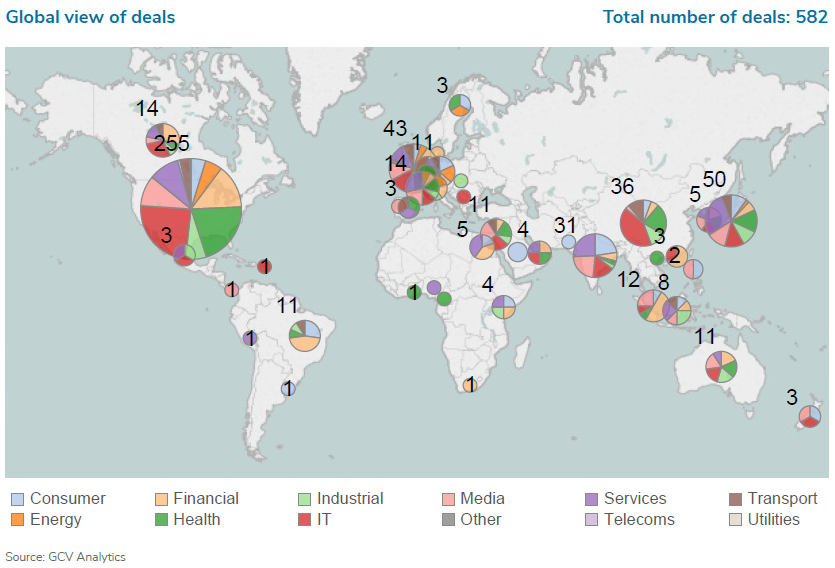
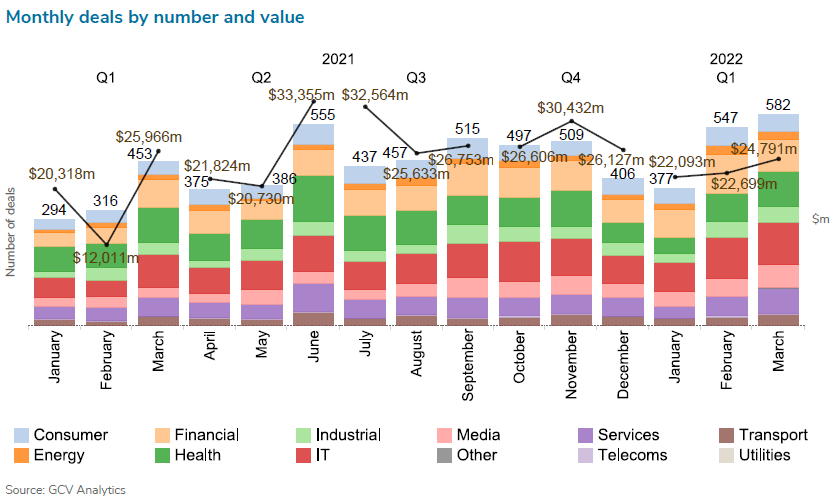
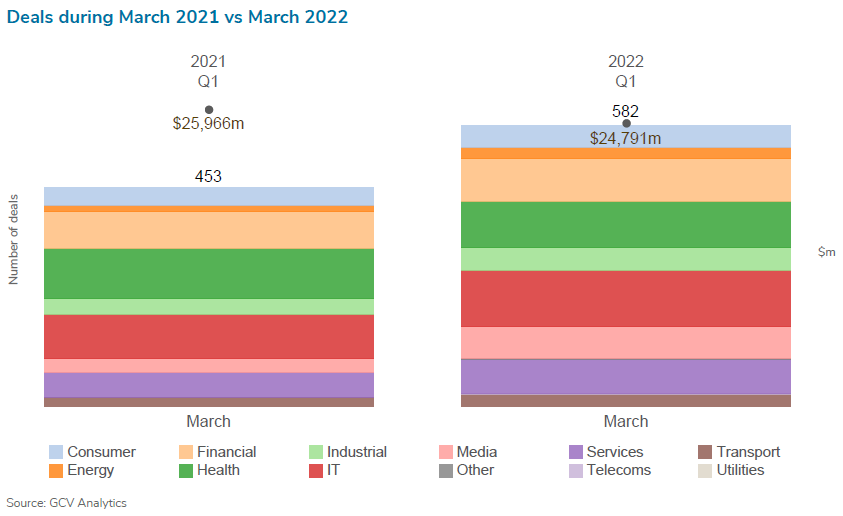
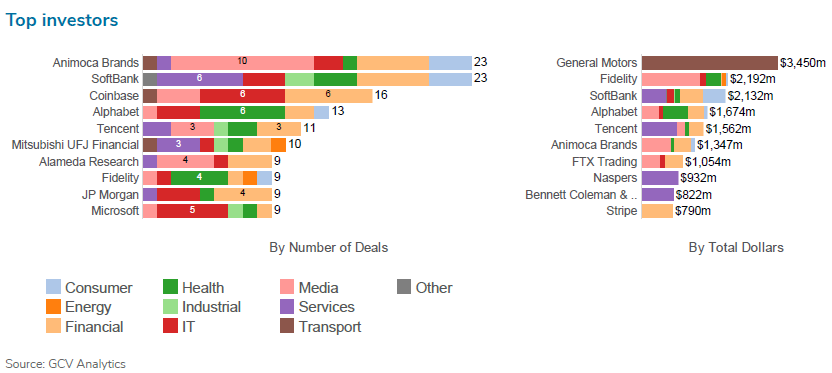
The leading corporate investors by number of deals were gaming and blockchain technology group Animoca Brands, telecoms and internet conglomerate SoftBank, crypto asset exchange Coinbase and diversified internet conglomerate Alphabet. In terms of involvement in the largest deals, automaker General Motors, financial services firm Fidelity and Alphabet were on the top of the list.
GCV Analytics reported 45 corporate-backed funding initiatives, including VC funds, new venturing units, incubators, accelerators and other. This figure was 22% higher than the one from March 2021, which had registered 37 such initiatives. The estimated capital stood at $3.68bn, nearly 28% below the $5.09bn from the same month last year.
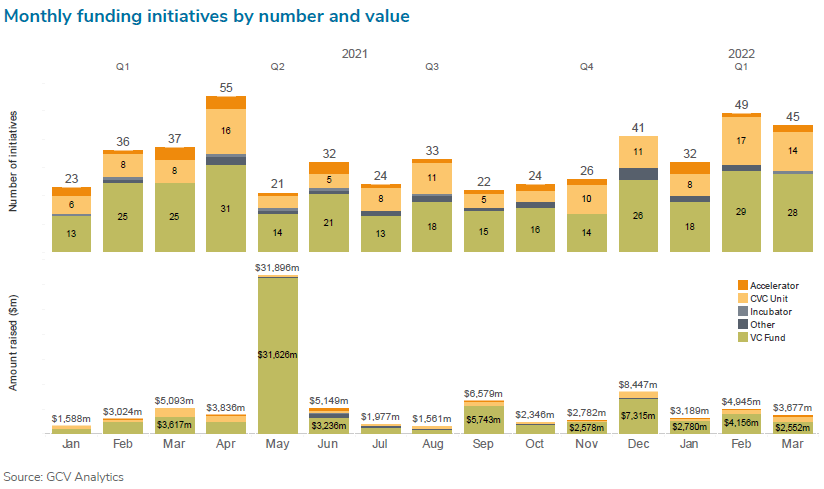
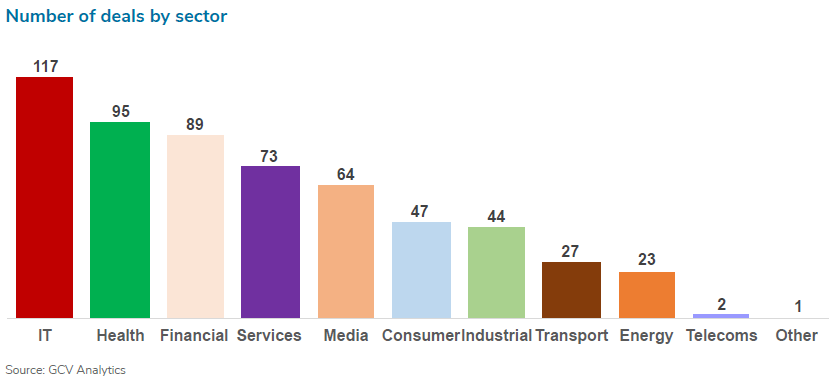
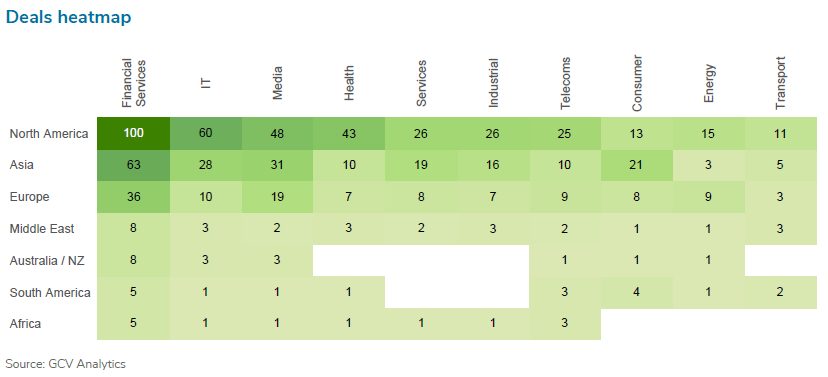
Deals
Emerging businesses from the IT, health, financial and services sectors led in raising the largest number of rounds in third month of 2022. The most active corporate venturers came from the financial, IT, media and health sectors, as shown on the heatmap.
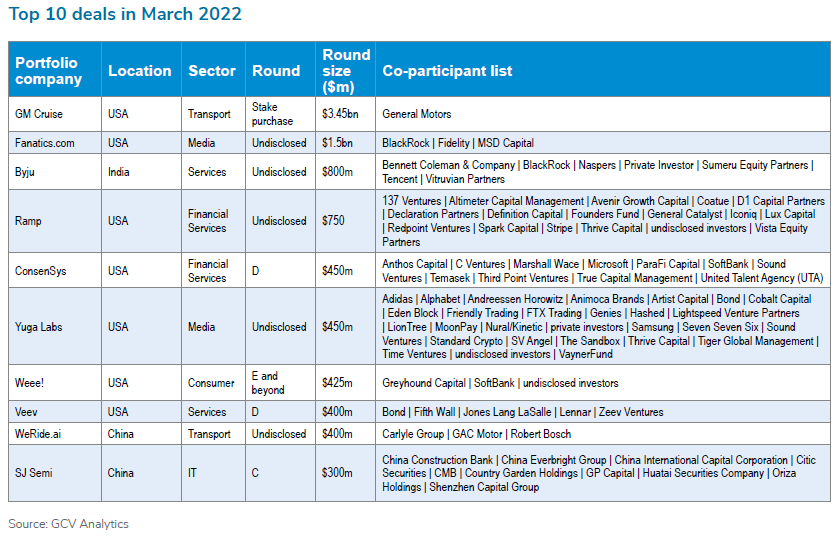
Car manufacturer General Motors (GM) agreed to acquire a stake in US-based autonomous driving technology developer Cruise held by SoftBank’s Vision Fund for $2.1bn. GM also made a $1.35bn primary investment in Cruise which will replace the funding pledged by Vision Fund in 2018. It was set to be triggered when Cruise launched a commercially available autonomous taxi service, an event which occurred. Vision Fund made the pledge when it invested an initial $900m as Cruise was spun off. It returned for a $1.15bn round the following year alongside GM, automotive manufacturer Honda and T Rowe Price at a $19bn valuation. Founded in Cruise has developed autonomous vehicles for use as taxis. It was spun off by GM in 2018, two years after it acquired the company in a $1bn cash and stock deal. GM and Honda both came back for a January 2021 round sized at over $2bn that included software provider Microsoft and undisclosed other investors. Retailer Walmart joined unnamed others to add $750m three months later. Cruise had acquired Voyage, an autonomous taxi developer backed by carmaker Jaguar LandRover and petroleum supplier Chevron, for $52m in March 2021.
US-based digital sports memorabilia retailer received $1.5bn of development capital from BlackRock, MSD Capital, Fidelity Management & Research and other investors. The transaction valued the company at $27bn. Founded in 1995, Fanatics’ e-commerce platform sells official licensed products covering a range of sports including baseball, American football, basketball, ice hockey and Nascar racing, and has been diversifying into areas such as sports-themed gaming, betting and media.
Byju’s, the India-based education services provider which counts internet groups Tencent, Naspers and media company Bennett Coleman & Co (BCC) among its investors, secured $800m in funding at a valuation of $22bn. The round was reportedly led by Byju’s founder Byju Raveendran to the tune of $400m, while BlackRock, Sumeru Ventures and Vitruvian Partners filled out the participants. Founded in 2011, Byju’s operates an online platform that provides a range of study resources including mock exams for students of all ages. Byju’s is reportedly looking to file for an initial public offering in the next nine to 12 months, opting for a regular listing over earlier plans to go public via a reverse merger with a special purpose acquisition company in the US.
Ramp, a US-based provider of a corporate card for controlling spending, raised $750m in debt and equity financing from investors including digital payment technology provider Stripe, valuing it at $8.1bn. Founders Fund led the $200m equity portion of round. The company also obtained $550m in debt financing from financial services firms Citi, which put up $300m, and Goldman Sachs, which provided $150m. Founded in 2019, Ramp offers an interest-free corporate card along with an expense management platform designed to save companies time and money. It claims it increased revenue nearly tenfold in 2021 and will use the proceeds to expand its travel management and expense report automation products and integrate with systems such as Amazon Business, Gmail and Lyft.
US-based blockchain technology provider ConsenSys secured $450m in series D funding from investors including SoftBank’s Vision Fund 2, software provider Microsoft and talent agency United Talent Agency (UTA). ParaFi Capital led the round, which valued the company at $7bn. Founded in 2014, ConsenSys provides developers with tools to launch applications on the Ethereum blockchain, covering areas including non-fungible token (NFT) marketplaces, decentralised finance applications and play-to-earn gaming. The company plans to convert the series D proceeds to Ethereum as it looks to increase its balance of Ethereum on hand relative to its US dollar holdings. Funding will also be used to expand and redesign its crypto-wallet platform, MetaMask.
Yuga Labs, the US-based creator of non-fungible token (NFT) collection Bored Ape Yacht Club, secured $450m in a seed round backed by multiple corporates at a post-money valuation of $4bn. The round included blockchain game developers Animoca Brands and The Sandbox, crypt ocurrency exchanges FTX and MoonPay, internet and technology group Alphabet, electronics producer Samsung, metaverse technology developer Genies and sports apparel producer Adidas. FTX, Alphabet and Adidas invested through FTX Ventures, GV and Adidas Ventures respectively. Founded in 2021, Yuga Labs is the creator of the Bored Ape and Yacht Club collections, made up of static image NFTs each showing an image of an ape with different styles and expressions. The cash will be used to grow its US team and support joint ventures and partnerships. The company acquired NFT projects CryptoPunks and Meebits from NFT developer Larva Labs earlier and released a new token called ApeCoin as it works on a metaverse projects dubbed Otherside.
SoftBank’s Vision Fund 2 led a $425m series E round for Weee, a US-based delivery service focusing on ethnic and geography-specific groceries. The round was filled out by Greyhound Capital alongside unnamed existing investors and it pushed the company’s overall funding to over $820m. Weee sources and provides a range of more than 10,000 hard-to-find ethnic grocery products North America through an online platform. The company has Chinese, Japanese, Korean, Latino, Vietnamese, Filipino and Indian offerings available for order through its service, which it says it is expanding by more than 500 new items each week, while also partnering with more than 1,000 restaurants. The capital will be used to expand Weee’s platform across new and existing ethnic grocery categories.
Veev, the US-based operator of a vertically integrated homebuilding service, secured $400m in a series D round featuring homebuilder Lennar’s LenX subsidiary and real estate services firm JLL’s Spark unit, which invested through its Global Ventures fund. Venture capital firm Bond led the round at a valuation of at least $1bn and it additionally included Zeev Ventures as well as Fifth Wall’s Climate Tech fund. Veev has created a panelised building system that involves housing components being manufactured in a factory and assembled on site to reduce construction times and costs. It has also developed smart home technology and a property management platform for rented accommodation.
China-based autonomous driving technology producer WeRide raised $400m from investors including car manufacturer GAC and industrial technology and applince manufacturer Robert Bosch. Private equity firm Carlyle and China-Arab Investment Funds also took part in the round, at a valuation of $4.4bn. It reportedly boosted the company’s total funding to over $1.2bn. Founded in 2017 as Jingchi, WeRide develops software and hardware to retrofit vehicles with the capability to achieve level 4 autonomous driving, which would allow cars to drive themselves but still give the driver the option of taking over.
China-based semiconductor foundry operator SJ Semiconductor (SJSemi) completed a $300m series C round that included real estate developer Country Garden’s venture capital arm, Country Garden Venture Capital. Financial services firms CMB International and China Construction Bank also took part in the round, the latter through its CCB PE and CCB Trust units, as did state-owned financial holding group China Everbright Group’s Walden CEL subsidiary. Founded in 2014 through a partnership between semiconductor foundries Semiconductor Manufacturing International (SMIC) and Jiangsu Changjiang Electronics Technology, SJSemi provides outsourcing services for chip manufacturing, including wafer bumping and testing.
Exits
GCV Analytics tracked 51 exits involving corporate venturers as either acquirers or exiting investors in March. The transactions included 37 acquisitions, two initial public offerings (IPOs), nine other transactions and three buyouts. The exit count was slightly lower than the March 2021 figure (53).
The total estimated exited capital stood at $3.97bn, considerably smaller than the $32bn from same month last year. These figures suggest that public and M&A markets are no longer as buoyant as they were last year, which makes sense in light of inflation issues and interest rate hikes.
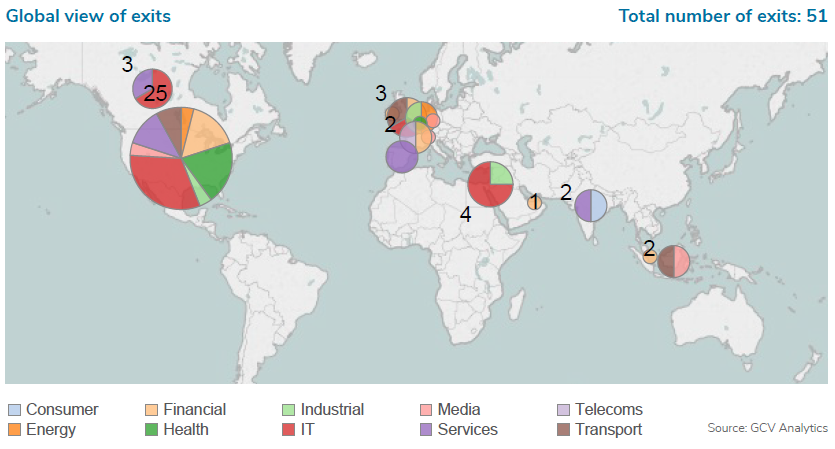
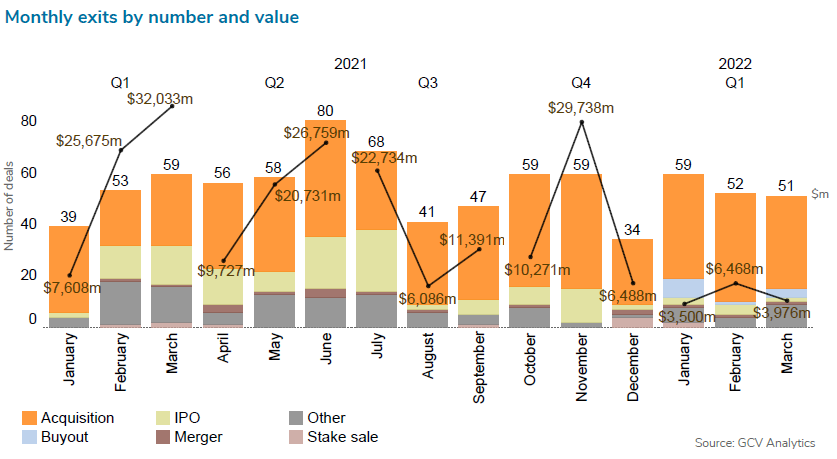
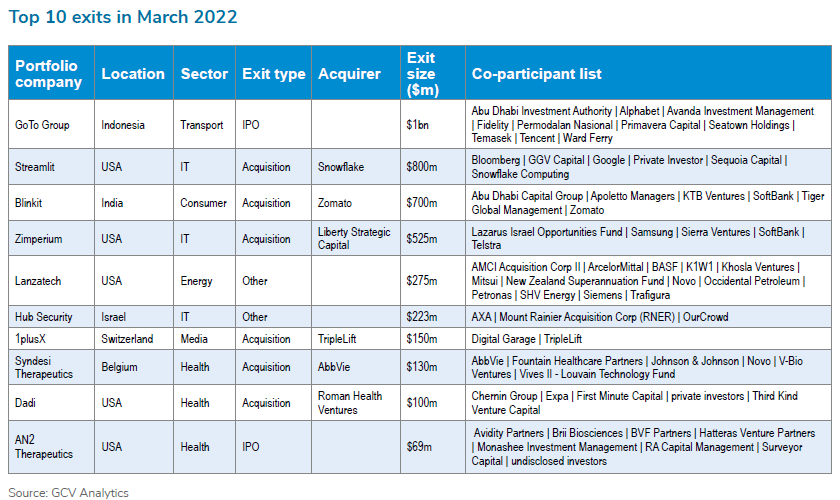
GoTo Group, the Indonesia-based, corporate-backed joint venture between ride hailing platform operator Gojek and e-commerce group Tokopedia, floated in a $1.1bn IPO. The company priced its shares at Rp 338 ($0.024) each, reportedly above the middle of the Rp 316 to Rp 346 range it had set earlier. Formed in May 2021 by Tokopedia and GoJek, GoTo provides a portfolio of mobile services covering e-commerce, financial services and on-demand consumer offerings that cater to some 55 million active users a year.
Data software producer Snowflake agreed to acquire Streamlit, a US-based data application software provider backed by internet technology provider Alphabet and media group Bloomberg, for $800m. Streamlit’s overall funding stood at $62m as of a $35m series B round in April 2021 led by Sequoia Capital and backed by Google’s Gradient Ventures fund and GGV Capital. Its earlier investors included Bloomberg-sponsored VC firm Bloomberg Beta, Elad Gil and Daniel Gross. Streamlit provides an open-source app framework used by data scientists to develop machine learning and data science applications. Its software is used by companies such as consumer electronics producer Apple, carmaker Ford and ride hailing service Uber.
Restaurant listings and food delivery service Zomato agreed to acquire one of its portfolio companies, India-based rapid delivery service Blinkit, in an all-stock deal valued between $700m and $750m. Founded in 2013 as Grofers, Blinkit operates an online platform where shoppers have access to a range of food, household and personal care products available for delivery in under 15 minutes. Amid intensifying competition with rival food delivery services such as Swiggy, Blinkit has scaled back its activity in some Indian cities to ensure a greater proportion of 10-minute delivery markets.
US-based mobile security platform developer Zimperium, which counts corporates SoftBank, telecomms company Telstra, engineering firm Toyo Corporation and and electronics manufacturer Samsung as backers, agreed to a $525m acquisition by private equity firm Liberty Strategic Capital. Founded in 2010, Zimperium provides enterprise security software for mobile platforms like iOS, Android and Chromebook, detecting threats on devices and serving a range of industries including healthcare, financial services and defence.
LanzaTech, a US-based carbon capture technology developer backed by corporates ArcelorMittal, Mitsui, Novo, Siemens and Petronas, agreed a reverse merger with special purpose acquisition company (Spac) AMCI Acquisition Corp II. The transaction will give the combined business a pro forma equity valuation of approximately $2.2bn and it will take the spot on the Nasdaq Capital Market secured by AMCI Acquisition Corp II in a $150m initial public offering in August 2021. The deal will be boosted by $125m in private investment in public equity (PIPE) financing from investors including conglomerate Mitsui, steel producer ArcelorMittal, chemicals manufacturer BASF, engineering infrastructure provider Primetals Technologies and energy distributor SHV Energy. LanzaTech’s gas fermentation technology captures waste carbon generated during the manufacturing process and converts it to useable products such as fuel, fabrics or packaging. It is set to be the first carbon capture technology provider to get a public listing once the deal closes.
Israel-based cybersecurity technology provider Hub Cyber Security agreed a reverse with special purpose acquisition company Mount Rainier Acquisition Corp (RNER) that will allow insurance group Axa to exit. The merged business will be valued at $1.28bn and will take the slot on the Nasdaq Global Market acquired by RNER in a $173m initial public offering from October 2021. The deal will be supported by $50m in private investment in public equity financing from unnamed existing and institutional investors. Hub has developed a cybersecurity software platform designed to work with confidential government or corporate information, offering threat protection and end-to-end security functionality to a global client base.
Internet company Digital Garage exited 1plusX, a Switzerland-based developer of advertising data management software, in an acquisition by advertising technology producer TripleLift, reportedly sized at $150m. The company had raised a total of over $17m, $7.8m of which came in a January 2021 series B round led by Swisscanto Invest and backed by digital Garage vehicles BI.Garage and DG Daiwa Ventures. Founded in 2014, 1plusX has developed a marketing platform designed for user and asset-level data computation and management, which combines information from all channels and recognises behavioural patterns enabling real-time prediction of the use of content and the display of advertisements and offers a data cleanroom type setup, enabling advertisers and media companies to securely share data in a cookieless world.
Syndesi Therapeutics, a Belgium-based developer of cognitive impairment treatments that was spun off by biopharmaceutical firm UCB, was acquired by pharmaceutical firm AbbVie for $130m upfront in a deal that could reach $1bn with milestone payments. The transaction provided exits for Vives Louvain Technology Fund and V-Bio Ventures, both of which contributed to Syndesi’s $21m series A round in 2018. Syndesi Therapeutics was spun out of biopharmaceutical firm UCB in 2018. The company is developing treatments for a range of diseases caused by synaptic dysfunction, such as Alzheimer’s disease.
US-based fertility service provider Dadi, which counts the Chernin Group among its backers, was acquired by Roman Health Ventures for $100m. Founded in 2018, Dadi offers an at-home male fertility test and sperm storage kit. The service includes a patented kit that is discreetly delivered to the patient home using a preservative that protects the deposit until it reaches the laboratory, enabling patients to get an easy and faster way to test their fertility and store their sperm. The acquisition will help the acquirer to launch the Ro Sperm Kit, an updated and rebranded offering powered by Dadi’s proprietary collection, testing, and storage kit and create the first direct-to-patient fertility offering to support any individual or couple’s needs.
US-based lung disease therapy developer AN2 Therapeutics, which counts pharmaceutical firm Brii Biosciences as a backer, raised $69m in an IPO on the Nasdaq Global Select Market. The offering involved the sale of 4.6 million shares, upsized from 4 million and priced at $15.00 each, in the middle of the offering’s $14 to $16 range. Founded in 2018, AN2 is developing treatments for chronic and rare lung conditions including mycobacterial lung disease. It will use the proceeds to take its lead drug candidate, epetraborole, a daily broad-spectrum oral medication licensed from biopharmaceutical company Anacor Pharmaceuticals, through phase 2 and 3 trials before expanding it internationally.
Note: Monthly data can fluctuate as additional data is reported after each issue of GCV magazine goes to press
